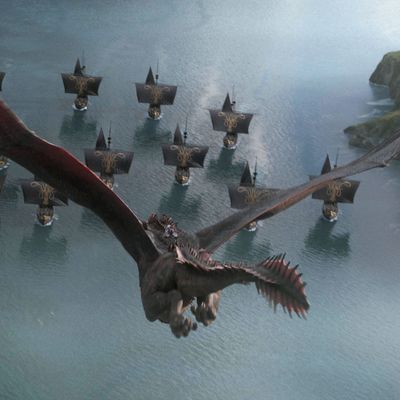
Daenerys Targaryen is losing dragons faster than sheÔÇÖs losing advisers. Only a few episodes after poor Viserion was killed, reanimated as an ice-dragon, then re-killed, Rhaegal followed its sibling into the great beyond thanks to Euron GreyjoyÔÇÖs impeccable aim (not to mention his magical invisible Iron Fleet). Now, Drogon is not just the only dragon that Game of Thrones cares about; itÔÇÖs also the only dragon on Game of Thrones, period. WeÔÇÖve been told over and over again that DaenerysÔÇÖs dragons are the first the world has seen for 150 years, which means that Drogon, as far as we know, is the only dragon alive. But does that necessarily make it the last dragon? ItÔÇÖs time to dive into the question that many have put in cruder terms: How do dragons reproduce?
We know from the main series that dragons lay eggs, but for more info on the ins and outs of dragon sexuality, weÔÇÖve got to dive into Westerosi lore. Much of what we know about dragons comes from Septon Barth, a Hand of the King who lived two centuries before the events of the show. A learned man, Barth became fascinated by dragons after witnessing the horrific death of a Targaryen princess who had traveled to Valyria on the back of Balerion, the Black Dread. After years of research, Barth eventually produced the book that became the ultimate authority on the subject, Dragons, Wyrms, and Wyverns: Their Unnatural History. Most copies would eventually be burned on the order of a subsequent, particularly pious king, but fragments have survived, and itÔÇÖs from these scraps we get most of the information we know about dragons in the books.
As luck would have it, one of those excerpts directly touches on the question of dragonsÔÇÖ gender. While Maester Aemon is dying in A Feast for Crows, he expresses his belief that Daenerys is the prophesied Prince That Was Promised, since the word has no gender in the original High Valyrian. By way of explanation, he references Unnatural History. ÔÇ£The error crept in from the translation,ÔÇØ Aemon says. ÔÇ£Dragons are neither male nor female, Barth saw the truth of that, but now one and now the other, as changeable as flame.ÔÇØ
In-universe, Barth is generally considered a crank, and books like The World of Ice & Fire and Fire & Blood, which have the historiographical conceit of being written by maesters at the Citadel, persist in labeling specific dragons as either male or female. However, Barth is one of George R.R. MartinÔÇÖs favorite historical figures, and when it comes to magical matters, you usually wonÔÇÖt go wrong in assuming heÔÇÖs got it correct. So, yes, itÔÇÖs probably safe to say these dragons are indeed genderqueer icons, though their preferred pronouns remain unknown.
How that plays into the specifics of dragon reproduction is a little unclear. Dragons do have sex, and they appear to mate for life: Vermithor and Silverwing, the dragons ridden by King Jaehaerys I and his wife, Alysanne, became a pair as well, and according to The Princess and the Queen were seen ÔÇ£oft coiled about each other in the fieldsÔÇØ even after their original riders died. But Martin has kept mum on the connection between dragon sex and dragon eggs. Some dragons laid a bunch of eggs, and were assumed to be female; others never laid eggs, and were assumed to be male. However, there are legends that the dragon Vermax, which was considered male and had no known mate, left a cache of eggs in Winterfell during a diplomatic mission to the North. Even if true, this story is not entirely proof that dragons reproduce asexually ÔÇö like chickens, dragons could lay unfertilized eggs ÔÇö but itÔÇÖs certainly a sign they could.
And while my feelings on fan theories are pretty clear, I would be remiss if I left you without mentioning one relevant theory: Drogon spent much of season five wandering around Essos without Daenerys, and many fans have theorized that it may have laid some eggs all over the world. ItÔÇÖs certainly possible, but thereÔÇÖs also something thematically fitting about Drogon being the last dragon. WouldnÔÇÖt it be poetic for the last dragon to be all alone in the world, just like its mother?


